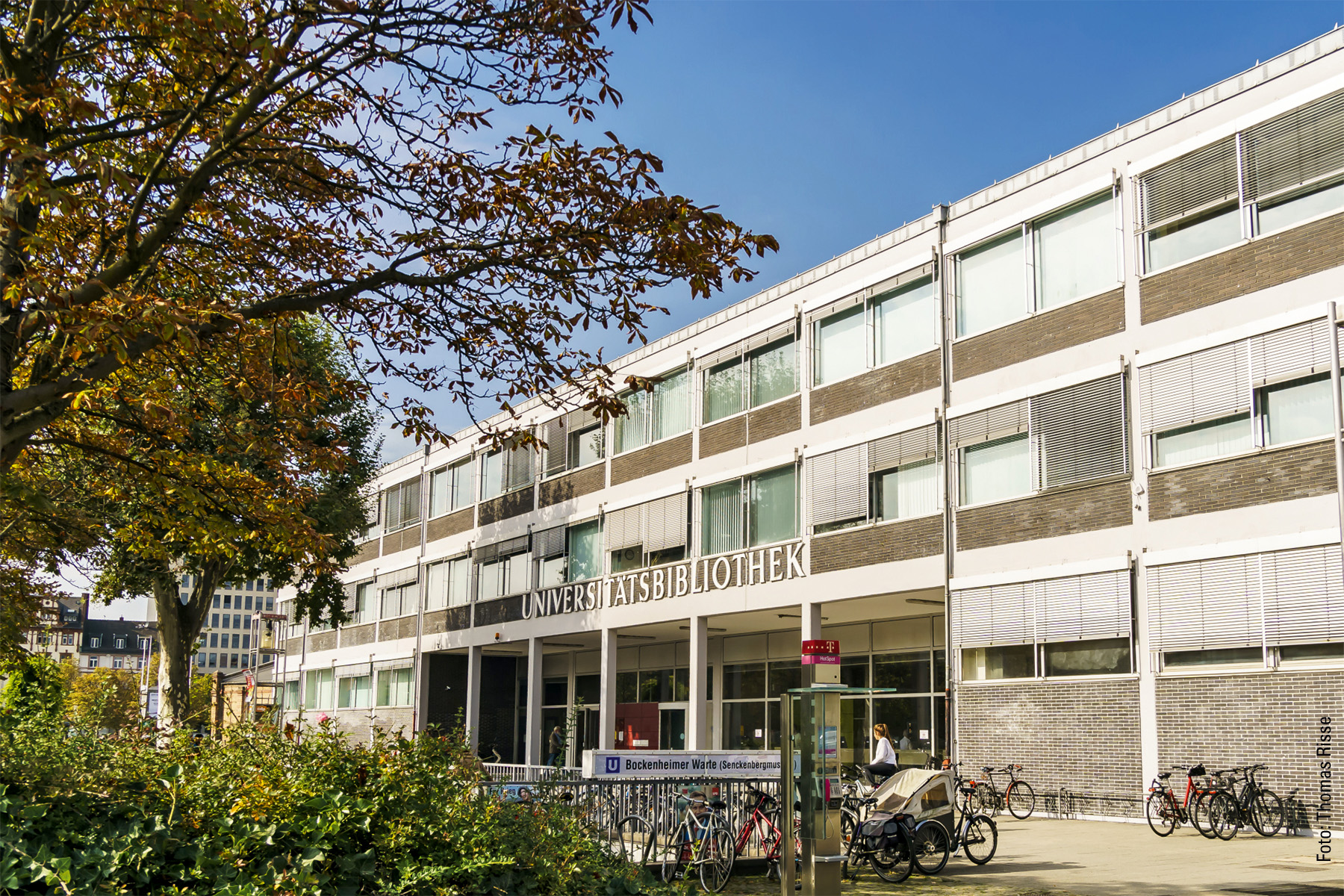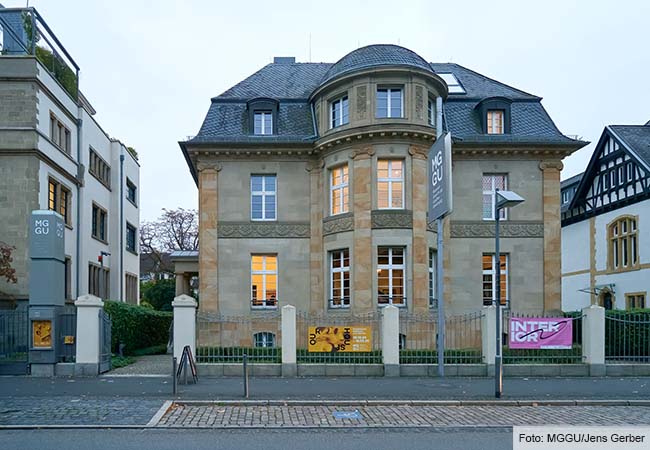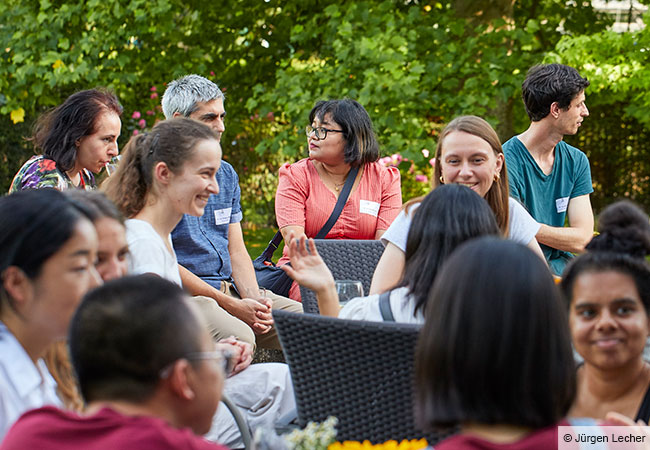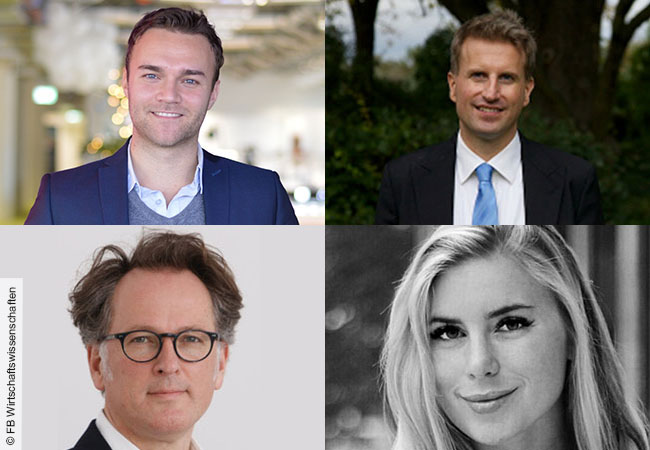
The wait has come to an end: Sociologist Stephan Lessenich, who has been working until now at LMU Munich, has been appointed as professor at Goethe University and as director of the prestigious Institute for Social Research (IfS). The newly created cooperative professorship, which is linked with the directorship at the IfS, was made possible through the provision of special funds from the Federal State of Hessen. In this way, the university and the institute are coming closer together.
In 2018, Professor Axel Honneth retired as director of the Institute for Social Research, and since then Professor Ferdinand Sutterlüty has been temporarily in charge, heading the institute for two and a half years with tremendous dedication. Now there is a new constellation: With funding from the Federal State of Hessen, a professorship for “Social Theory and Social Research” is being set up at Goethe University – as a distinct cooperative professorship with the Institute for Social Research. The first incumbent has now been announced: Sociologist Professor Stephan Lessenich, currently at LMU Munich, has accepted the call to Frankfurt and will take up his new post on 1 July.
“I’m very pleased that Stephan Lessenich is coming to Frankfurt as professor and new director of the IfS,” says Angela Dorn, Hessen’s Minister of Science. “The importance of the work conducted by the Institute for Social Research has rarely been as manifest as it is right now. We need it to prevent the division of society. The IfS stands in a philosophical tradition that is not content with merely interpreting the world in different ways, but also wants to change it in the spirit of relentless questioning, constructive criticism and discursive debate. To be able to bolster this important role of the IfS by introducing top-class new management, we’ve happily raised the state’s funding from 2021 onwards from a previous 615,000 to € 870,000 per year.”
“It’s a very pleasing development for Goethe University that the institute is now moving even closer to the university through the arrival of Stephan Lessenich. Professor Lessenich has made an international name for himself through his research and will give the university and the IfS even greater visibility worldwide,” says Professor Enrico Schleiff, president of Goethe University. “Stephan Lessenich is very successful in combining sociological theory building and empirical research. “I’m convinced that the Frankfurt perspective will play a powerful role in future social debates,” says Professor Birgit Blättel-Mink, dean of the Faculty of Social Sciences, commenting on the appointment. Jutta Ebeling, chairperson of the IfS’s board of trustees: “I’m pleased that we’re now placing the institute on a new footing and that we were able to recruit such a renowned scholar to head it. We’re greatly indebted to Professor Sutterlüty, who for two and a half years has steered the institute with great dedication through a difficult period”.
“It’s a great honour for me to be asked to head an organisation that can look back on such a long tradition in critical social theory. Above all the sociological perspective is of growing significance in these times of social upheaval and socio-political agenda setting,” says future IfS director Professor Stephan Lessenich. “I’d like to further develop the IfS as a lively place for intellectual exchange. Something else particularly close to my heart is the institute’s internationalisation: The future of critical social research is conceivable only from the perspective of the globalised world,” says Lessenich, describing his first ideas for the institute. He is greatly looking forward to Frankfurt too: “The city stands for a public with an exceptional interest in politics and culture, for a liberal culture of discussion and intellectual openness.”
About Stephan Lessenich
Born in Stuttgart in 1965, Lessenich studied political science, sociology and history in Marburg from 1983 to 1989. He earned his doctoral degree in Bremen in 1993 and in 2002 received the venia legendi (authorisation to teach) in sociology at the University of Göttingen. His first professorship took him to the University of Jena, where he taught “Comparative Social and Cultural Analysis” and initiated the Research Group “Post-Growth Societies” funded by the German Research Foundation, together with Klaus Dörre and Hartmut Rosa. In 2014, Lessenich was called to the Chair for Social Developments and Structures at the Department of Sociology of LMU Munich, as successor to Ulrich Beck. From 2013 to 2017, Lessenich was chairperson of the German Sociological Association (GSA), he is co-editor of various scientific journals and book series and, among others, one of the speakers of the board of trustees of the think tank Institut Solidarische Moderne (ISM). He also plays a proactive role in social processes: He is, for example, a member of the scientific advisory board of Attac and in 2017 was co-founder of the “mut” party in order – as he says – to offer some opposition to the “shift in discourse to the right” in the wake of the long summer of migration.
How the new concept developed
In a press release by the Science Council (Wissenschaftsrat) concerning the evaluation of the institute in 2015, the “combination of socio-philosophical theory formation and empirical social research in the tradition of the history of ideas of the ‘Frankfurt School’” practised at the IfS was called “unique worldwide”. Its scientific accomplishments were rated “very good and in some areas even excellent”. In addition, as the press release continued, the institute performed essential “interpretative work in the field of contemporary diagnostics” for a broader audience. However, it was also said at the time that “the institute’s research work often suffers from a lack of opportunities for strategic development”. The existence of “central research priorities” was repeatedly under threat, and the institute was excessively dependent on third-party funding. The Science Council recommended a more robust organisational substructure as well as a network of stable partnerships. The press release went on to say that in order to achieve this, among others the office of the director must be endowed with a permanent position financed from institutional funding and cooperation with Goethe University expanded and formalised.
In a complex process, a concept for such closer cooperation was developed in discussions with the university’s executive board and in close consultation with the Hessian Ministry of Higher Education, Research, Science and the Arts, along with a new model for the management of the IfS. This process was supervised by Jutta Ebeling, former head of department and mayor of Frankfurt and, since 2018, chairperson of the IfS’s board of trustees. She had already been instrumental in setting up the Professorship for Holocaust Studies in Frankfurt. Based on the model of this cooperative professorship with the Fritz Bauer Institute, the aim was to create a new professorship in cooperation with the IfS. This will now be hosted by the Institute of Sociology.
In the past, professors from Goethe University were appointed as directors of the IfS and performed this task more or less on an honorary basis, without anything about their work at the university changing in the process. With the new model, only 50 per cent of the respective professorship is at Goethe University, with the other half at the institute.
About the Institute for Social Research
The Institute for Social Research (IfS) at Goethe University is closely associated with the names Max Horkheimer and Theodor W. Adorno, but also Erich Fromm, Herbert Marcuse or Leo Löwenthal. Founded in 1923 with funds from patrons Hermann and Felix Weil as an institute for academic Marxism, with Max Horkheimer the IfS became the central research centre for critical theory. In the spring of 1933, the institute was closed by the Gestapo because of “subversive activities”. Via circuitous routes, it managed to move to Columbia University in New York and continue its work in exile. After the war, the institute’s closest circle – Adorno, Horkheimer and Pollock – returned to Frankfurt, and in 1951 the IfS was re-established at its present location. Since then, the Federal State of Hessen and the City of Frankfurt have secured its basic budget. In the course of its soon 100-year history, the IfS has left its mark on science and society in many ways. Professor Axel Honneth, the institute’s last director, developed in his writings a normatively substantial social theory of recognition.







